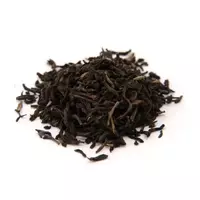Black tea

The process of making black tea, which is commonly called red in China, can take from fourteen days to one month, during which it undergoes prolonged fermentation or oxidation. The useful properties of black tea have been known for a very long time, so the popularity of this drink is easy to explain.
It is recommended to brew black tea with very hot water, the temperature of which can vary in the range of 90-100 degrees. They insist on it a little longer than, for example, green tea. The finished aromatic drink is perfectly combined with lemon, cream or milk, but separately, since when these products are combined, milk protein folds. The calorie content of black tea is approximately 15
1. 8 kcal per 100 grams, but this is completely unimportant, since about one gram of dry raw materials is needed to prepare a cup of hot drink.
Types of black tea
Interestingly, there are a considerable number of types of black tea, but above all it is divided into baikhovy, granulated, packaged and tiled. In addition, quite often it is flavored, for example, with bergamot oil, citrus extracts, vanilla, cinnamon or other additives.
Depending on the country of manufacture, the most popular varieties or types of black tea around the world are: Yunnan, Kimyn, Assam tea, Earl Gray, Darjeeling, Lapsang Sushong, Ceylon and Puer.
Black Tea Composition
The composition of black tea is quite complex: it contains alkaloids, organic acids, tannins, special pigments, vitamins, essential oils. All these elements give the finished drink its specific aroma and a slightly tart taste. Tannins in black tea are represented by some polyphenolic compounds, to which, for example, tannin belongs. Due to it, tea is characterized by astringent and strong bactericidal properties.
The benefits of black tea
Due to the content of some vitamins, in particular, A, C, B and PP, the benefits of black tea are obvious to humans. For example, it is precisely because of the presence of vitamin PP with regular consumption of black tea that a gradual strengthening of the vascular walls is observed and their elasticity improves. In addition, black tea includes such important trace elements as phosphorus, potassium and fluorine.
Traditional medicine claims the benefit of black tea as an excellent sweating and mild diuretic. In connection with these actions, its use within reasonable limits has a beneficial effect on the state of the kidneys and the body as a whole. This is due to the properties of black tea to remove toxins and other harmful substances from the body, as well as produce an antipyretic effect.
The harms of black tea
Despite all the benefits of this product, do not abuse it in order to avoid the possible harm of black tea, which can manifest itself in increased blood pressure, insomnia and headaches.
black tea 151.8 kCal
The energy value of black tea (Ratio of proteins, fats, carbohydrates - ju):
Proteins: 20 g (~ 80 kCal)
Fats: 5.1 g (~ 46 kCal)
Carbohydrates: 6.9 g (~ 28 kCal)
Energy ratio (bj | y): 53% | 30% | 18%
 Español
Español Français
Français Português
Português Русский
Русский 简体中文
简体中文 繁體中文
繁體中文 日本語
日本語 한국어
한국어 العربية
العربية Türkçe
Türkçe Қазақ
Қазақ Deutsch
Deutsch Italiano
Italiano Українська
Українська
